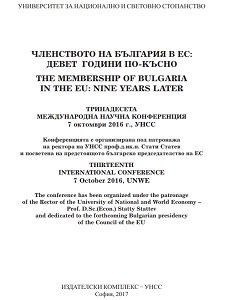Третият енергиен пакет на Eвропейския съюз и либерализацията на пазара на електроенергия в България - резултати и предизвикателства
The Third Energy Package of the EU and the Liberalization of the Electricity Market in Bulgaria – Challenges and Results
Author(s): Vasil Stoynov
Subject(s): Politics / Political Sciences, Politics, Law, Constitution, Jurisprudence, Environmental and Energy policy, EU-Legislation
Published by: Университет за национално и световно стопанство (УНСС)
Keywords: Liberalization; Electricity Market; Transposing; Independent Transmission Operator; Consumer Protection
Summary/Abstract: Bulgaria has been conducting a vivid and consistent policy since 2012 in regards to the harmonization of the electricity market with the European standards as stipulated in the EU’s Third energy package. The first step into this direction was the adoption of national legislative changes transposing Directive 2009/72/EC of the European Parliament and of the Council requirements and adapting them to the national energy sector specifics. The changes include all key requirements by the EU and, most of all, the selection of a model to separate the electricity transit from the chain of production and delivery. Bulgaria has adopted the model of an independent transmission operator where the ownership and the management of the electricity grid are mandated to a certified company which is part of the vertical integrated company and it meets certain conditions for independence. Along with those changes, the national legislature pays attention to consumer protection, enhanced the role of the national regulator and encouraging cross border partnerships. The adopted legal texts serve as a fundament for the process of electricity market liberalization which shall be continued with certain actions by both the regulator and the market participants. The article reviews the positive changes which had occurred in the recent years during the implementation of the requirements for more competitive, efficient and secure market. To latter we could refer the separation and certification of Electricity System Operator EAD as an independent transmission operator, establishment of the Independent Bulgarian Energy Exchange, implementation of a free deregulated energy trade segment and accommodating opportunity for the consumers to choose their energy supplier. In conclusion, the article turns attention to still existent serious issues and challenges to the Bulgarian energy sector liberalization which shall be addressed.
- Page Range: 124-139
- Page Count: 16
- Publication Year: 2017
- Language: Bulgarian
- Content File-PDF

